Travel diary, part 10: Toliara and last days
Maeva* is an intern at ADES and is currently writing her Master's thesis in Madagascar. She gives us an insight into her experiences.
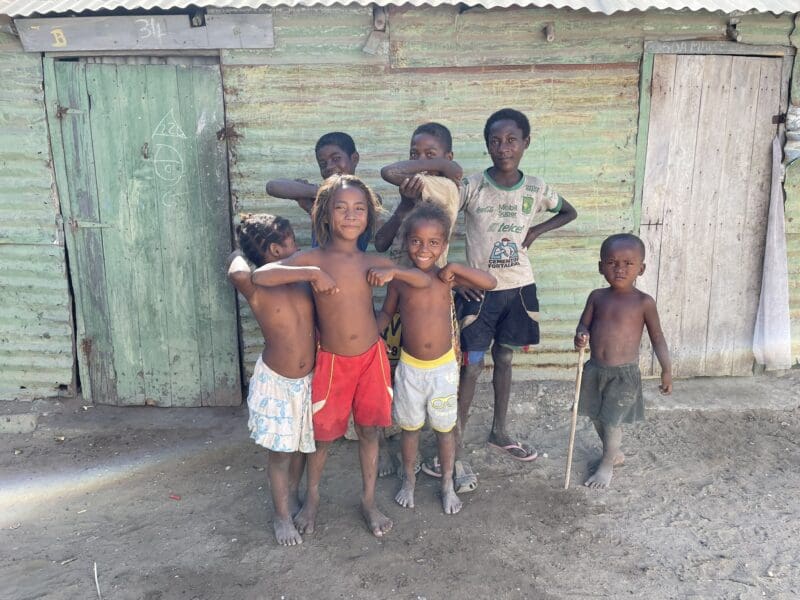
I'm back in Toliara. It's significantly less warm than last time. Although it's warmer than in Tana, the mornings and evenings are still quite chilly and I'm glad I have a jumper with me. For the first two weeks here, I am allowed to stay with Alain (the Directeur National) and his family, and it's nice to be part of their daily routine. In the mornings and evenings, Nome, the brother of Alain's wife Eula, takes me home from the ADES office by scooter. For the first time in a long time, I have a routine that I can get back into. So while the days are once again filled with a steady, regular rhythm, I spend the whole of Saturday getting to know the city a little better on foot. I walk through the city at a reasonably leisurely pace. I realise that I don't like stopping or slowing down very much, as I attract so much attention and I'm even more likely to be approached immediately to sell me things, offer me a pousse-pousse ride or something else. Walking on regularly limits this somewhat. I stand out more here than in Diego or Tana, and I hardly meet any other Vazahs. This is sometimes very exhausting and sometimes leads to unpleasant, but also very nice encounters.
For example, I meet Samba on Saturday morning. I've actually already walked past her cute little stall and realise how I now have to actively slow down my walking pace. I even walk back a few metres after deciding to stop by her. So I really did run too far at walking pace, passing her even though I wanted to stop. In any case, I sit down with her under the tin roof, where she serves me warm tea and two freshly baked mokary. Mokary look like little mini pancakes, but are made from rice powder and coconut milk, I think, and with a little sugar they taste great. She speaks French quite well and it's lovely to be able to sit on the wooden bench with her, watch people walk past and watch us in amazement, drink the very sweet tea and listen to her tell me about her life. She has six children and used to be a housekeeper for some of the Vazahs before they sadly moved away. Her husband is a taxi-brousse driver and she already has a grandchild. But her husband's income is not quite enough, so she sells fresh mokary and sometimes fried balls at her stall every day. She gives me her number in case I hear anything about a possible job, and I make a mental note to visit her again. She is incredibly sweet, and when the neighbour looks out of his kiosk window and asks who I am, she tells him I am a distant daughter of hers.
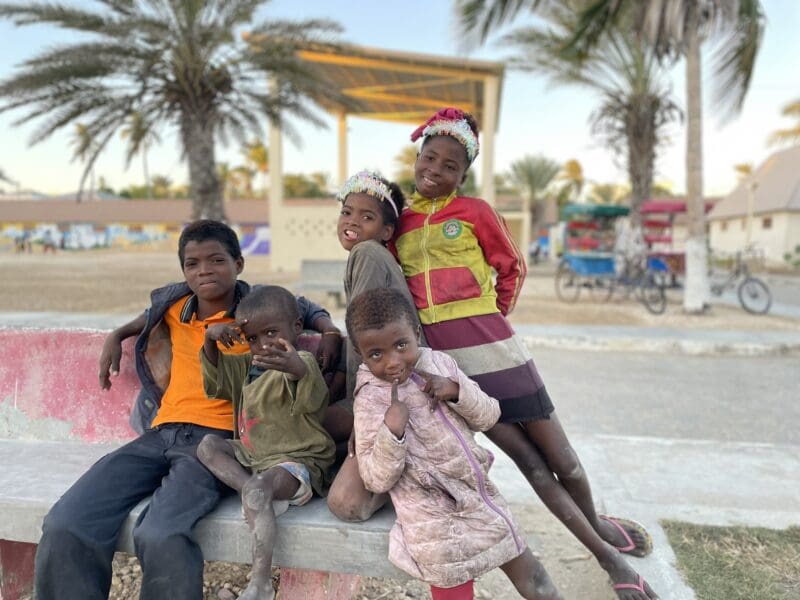
I have so many different impressions of Toliara that I can't really go into them all in depth. I'll just tell you about them as I encountered them, without any major transitions. While I'm sitting in a small café, I watch four children come past me in a homemade cart. Hanging together with anything that rolls, they have built a kind of cart that two of them push while they can put everything they collect into a large container with cardboard, plastic, snippets and other treasures, while one of the children is pulled behind and another sits in front. When they come round, they want my plastic cup, which I am only too happy to give them. I would love to give them a lot more. I watch three children playing in a similarly inventive way: They had cut a canister in half, attached a string to the bottom half, and while the older of the two pulls the canister at the front, the little boy in the back squeals with delight, while a third child also helps to push from behind. No matter where I am, there's dust everywhere. I can feel it on my hands, on the computer, in my hair, under my fingernails, in the air, everywhere. I've never showered as often in my life as I have these days here. Sometimes, when I get on the back of the motorbike at around 5pm and we set off, it's like a shock. It's like waking up and it takes a brief moment to wake up and get away from the world that exists between my eyes, the screen and my head. Then I suddenly land back in the middle of life, I'm here again, breathing in the dust, blinking in the golden-red light, watching the food stalls and the people as we skip across the piste, and I'm incredibly grateful to still be here. You can almost always see people chatting together, a woman braiding another woman's hair, the huge wooden carts that are either heavily loaded and being pushed by three or so young men or, after being unloaded, the three of them take a running start and let themselves be carried along. The constant screeching of the brakes on the pousse-pousse is part of the experience. You really can't miss it, and the evening traffic is particularly cruel. The sound produces the same reaction in me as when nails scrape across a blackboard or a fork squeaks across a plate. Sometimes I get the impression that a lot of things that usually only happen behind closed doors here simply belong in the hustle and bustle. Hairdressing, cooking on the street, and yesterday I even saw a girl being washed stark naked by her mother on the pavement. The mother pauses briefly to sell some tomatoes to a customer while the girl waits with shampoo in her hair. "She was just dirty," the mother explained as she walked past.
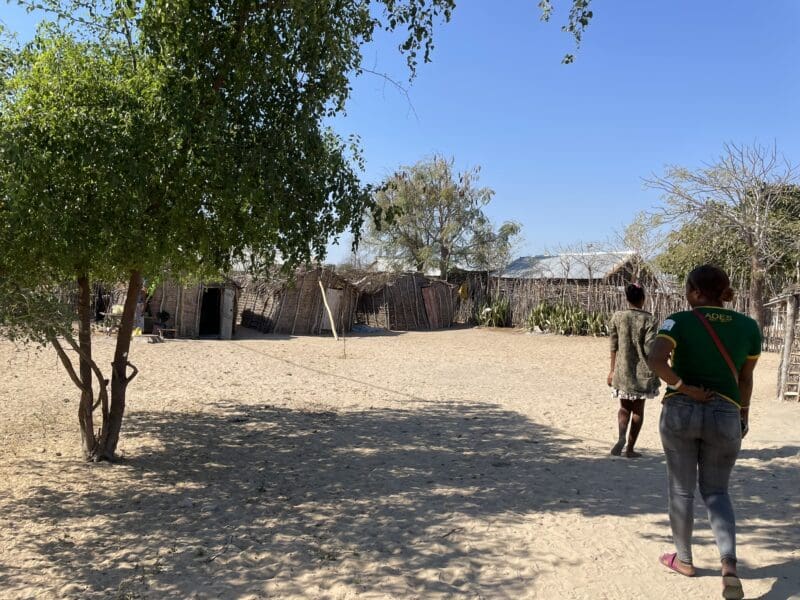
As you get away from the main road, the most charming neighbourhoods appear. With wooden fences, cacti further out, schools, houses made of palm leaves and branches. The ground is immediately sandy and you can often hear singing or music coming from somewhere. In one such neighbourhood, we went to visit Sali, the alcohol seller, for an interview (she uses the ADES sound cooker). That's not her real name, but it's how she's known throughout the neighbourhood. Anyway, it's funny how we get to the various cooker users. There are no exact addresses or house numbers here. So we always pick up at the nearest signpost (a school, church, police station, hospital, fork in the road) and from there we are picked up personally. At Sali's it's a small school and we arrive at her house with a large forecourt where the family business takes place: Alcohol is distilled in large black barrels between two huge tree trunks. I have to say, it looked very special. As we left, Roxanne, who was accompanying me, told me that there is no way of actually measuring the strength of the alcohol here. But it is known to be quite high in alcohol, as it is apparently particularly easy to ignite.
Something else that strikes me is the absolutely natural leaning, holding hands or other physical contact, especially with children, but also adults. When I was allowed to take part in a school project on environmental education and reforestation, I simply noticed how the children simply leaned on each other, supported each other while watching, and also on me. It wasn't long before I was standing in the middle of them, arm to arm, all shyness gone as soon as it was time to watch. I also felt that I had rarely made so much eye contact in my life as I did here, whether child or adult, man or woman. Perhaps people here have never been told that it is impolite to stare, and so anything interesting or exciting is simply looked at. It's not embarrassing either. Even in an accident, the first thing I saw was the many people standing in a very tight circle around the motorbike. But I feel that staring, looking, marvelling is somehow associated with a childlike curiosity that you don't lose as an adult or are taught better.
But what makes me despair and simply won't get into my head: so far, every lock on my room doors has turned the wrong way round! To open a door, the lock doesn't turn anti-clockwise as it does here, but clockwise. And vice versa to lock it. But as if that wasn't enough, they (the evil lock fitters) have even gone so far as to fit the lock the wrong way round, so that the keyhole is the wrong way round, just so that the doors can still be opened and closed the wrong way round. I forget every time.
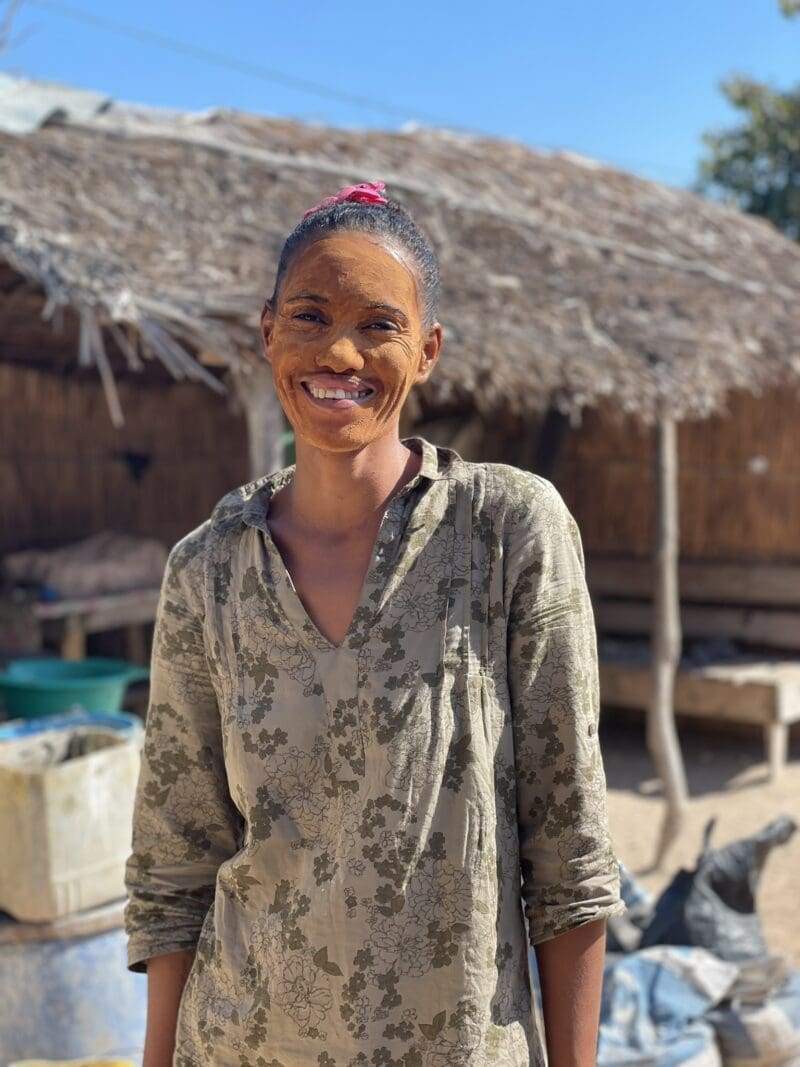
On Monday, I once again have lunch with Fara, the cook here at the Bureau National and an expert on solar cookers. We have salad and rice and fish, plus the still warm rice water with its slightly burnt flavour. It's nice to be able to eat with her, have a chat and really enjoy the typical dishes. Since I've been here, I've really rediscovered fish for myself. I've always liked the fillet, but I mean the whole fish, which is then served on the plate in pieces with backbone, skin, tail fin and skull. The fish is a delicacy, especially for people who belong to the Vezo (nomads who live mainly from fish). Just as I can gnaw on chicken thighs from an early age, here the head of the fish is really taken apart completely and eaten with fins and everything! I used to be sceptical or hesitant, deciding it wasn't for me. I had to put aside any hesitation, especially when Fara looks at me expectantly as I gorge myself on her prepared fish, which to me looks even more alive than cooked. Well, now it has become something for me sooner or later, having had grilled fish in front of me so often. Masurtoa Umana it is! (Bon appetit).
I love the Malagasy language. It's so incredibly melodious and just sounds really, really beautiful when it's spoken. With soft consonants, lots of vowels and word repetitions, it really is a singing language (for example zangazanga (walk), zengzeng (c'est comme ça), tsi azoko (you're welcome, for nothing), etc.). The "e" in particular is important and is emphasised more strongly, especially when shouted. For example, the emphasis in bye-bye is on the last "e" = bye-byeeee, and somehow sounds a thousand times nicer, I think.
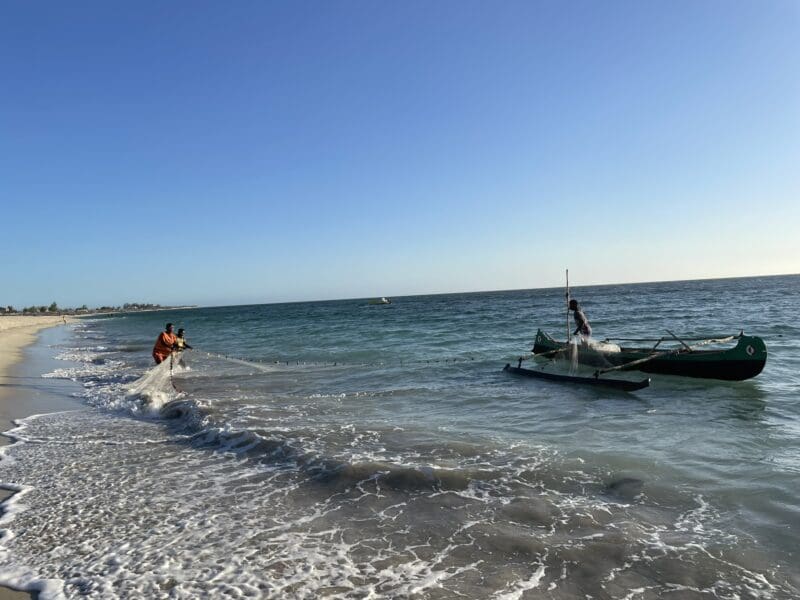
I'm sitting in Anakao right now and can hardly believe my luck. It's unbelievably beautiful here. It's so beautiful that it's actually impossible for me to be in a bad mood. It's so nice to start questioning your life, your priorities and, above all, how you spend your time. I start to make more new plans and resolutions than I ever did at New Year. It is a beauty that gives way to calm. A still, unmoving calm, like an eternal beginning, where time keeps turning but you don't feel it and instead you float in a precious, timeless and peaceful bubble. While the sun sets on the horizon. It's so outrageously beautiful that it almost hurts to know how briefly I'm allowed to be here, and I'm already preparing myself for the moment when I'll be sitting in an office somewhere in front of my computer again, missing this very moment and longing to be back here. It's more beautiful than on the cheesy postcards or Google images, and I'm practically alone. I have soft sand under my feet, a light breeze plays with my hair and the sun slowly sinks into the sea. My skin still tastes salty from the sea, a contrast to the sweet and sour Ti-Punch I ordered (rum and lemon), and I'm now enjoying the sound of the waves not 10 metres in front of me and listening to some Gorillaz and Warhouse. It's the kind of place and moment that just takes you straight away and makes you come to terms with yourself. A gateway to your inner self, which is not hidden behind to-do lists or stress or impressions and encounters, but stands right in front of you and you can get to know yourself again, all by yourself, all to yourself and listen to yourself. The sky turns from blue to green, to yellow, to orange, becoming softer and softer, fishermen walk home along the beach in front, for them this place is something completely different to me, characterised by a very different relationship, a different everyday life, a different life. I jumped from the deep and narrow, real version of Madagascar back into the tourist version. And even though it's far removed from the reality of the Madagascans, I'm just grateful and really enjoying being here.
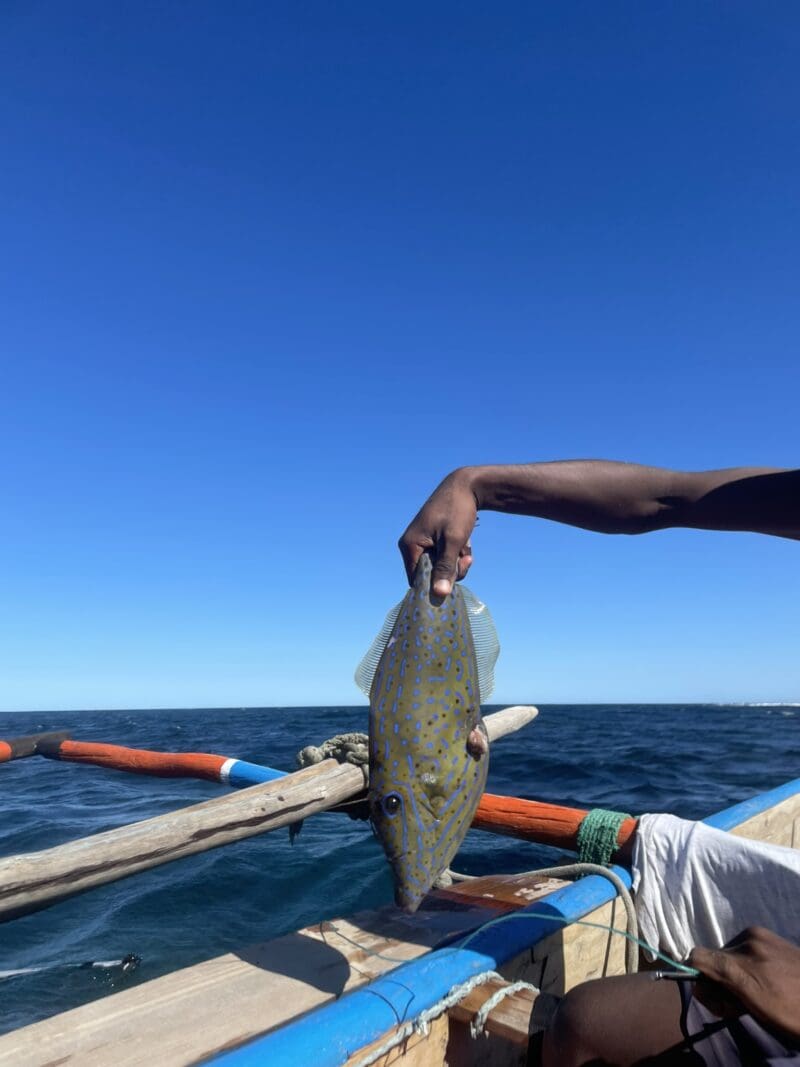
During my days here, I explore the very cute Vezo fishing village at the end of the beach, walk past all the different coloured pirogues, watch the fishermen setting sail at sunrise in the first rays of the sun as the full moon fades in the pink sky, observe how a huge net is hauled in in the evening and how a woman walks along in the morning with a huge fish in a plastic tub on her head to sell the fish or lobsters. On the second last day, I go diving with the brothers Bienvenue, Calîn and Flavio in the pirogue and then have a picnic on the small island of Nosy Ve opposite. So while I splash around in the water with fins and diving goggles and watch the coral and fish, Bienvenue dives in a wetsuit and with a harpoon and hunts four fish for our picnic.
While the fish are being scaled and gutted on the island, I notice three rather cheeky chickens that have spotted us and are now making their way to us with little fear and trying to get at the rice. Now apparently these are not just any chickens. Apparently they are not allowed to be killed and eaten, and there is a reason for this: when Vezo women or families in Anakao, for example, cannot have children, they come here to the island with a chicken or a goat and offer the animal as a sacrifice, so to speak. In return, they hope to have children. And so the chickens here are under a certain amount of protection and are slowly but surely establishing a pretty brave and cheeky chicken colony here... Just a little anecdote about Anakao.
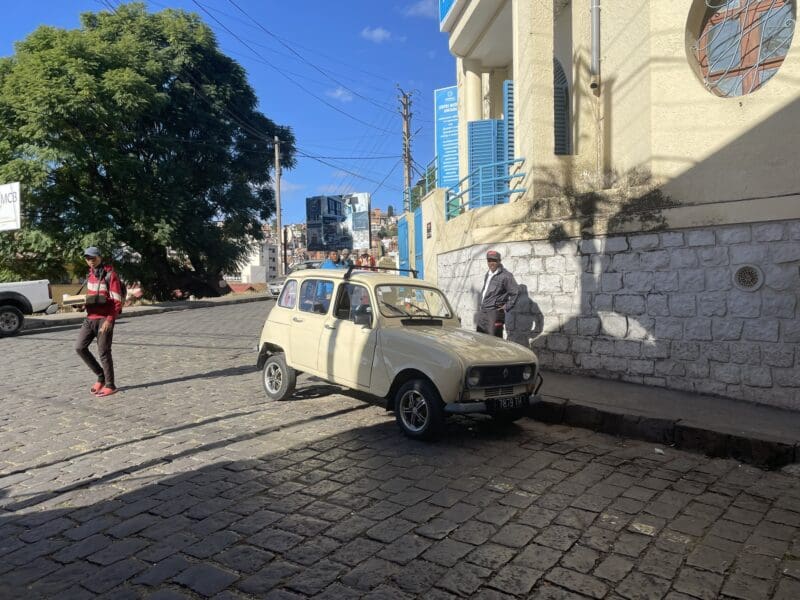
The days go by faster and faster. This is now my second last week here, and after a few more days in Toliara, I'll be heading back to Tana on Thursday before catching my flight back on Saturday. It's unbelievable how time flies; just now it felt like it was still the beginning of June. Travelling through Madagascar with ADES was a completely different experience for me. It allowed me a closeness, a depth and an insight that I would otherwise have been denied. I am here for a different purpose than just tourism, I get to know people on a completely different level. It really is a different feeling to be travelling like this. On Friday, we will hopefully celebrate a little with everyone who wants to and is there from the team in Tana before Azagen and I get back on the plane. Fortunately, enough time has now passed that I'm looking forward to travelling back to Switzerland again. I'm especially looking forward to eating more vegetarian dishes again! I'm sooo looking forward to the fruit now in summer, the bread, the salads, the cheese and fresh, cold dishes! I'm looking forward to speaking Swiss German, cycling, the river Aare and home.
At the same time, it will certainly be a strange feeling to come home again. I could imagine that it might be strange for a short time when no one looks at me. Here I have so much attention and eye contact. Back home, I'm once again part of an absolute majority, and in a society where the smartphone dominates everyday life. And where traffic follows the traffic rules, where the air doesn't smell of smoke, where women don't often walk along the streets barefoot in colourful scarves, where there are no wonderful open pousse-pousse and bajajs as a means of transport, where there are children everywhere you look, where repairs are carried out directly on the pavement, where wooden carts are not yet driven by motor power, where everyone grabs the microphone without hesitation to sing karaoke, the generous and honest laughter that is also given to strangers, where people have breakfast together on the street, up to five people ride home on a motorbike, baguettes are carried unpacked in large baskets on people's heads, children beg on the street, policemen hold out their hands for money to passing cars, the bright white neon light that illuminates some stalls in the evening, where people still mostly cook with coal, wood or on an open fire, and finally, in the evening, song and music float through the air... Yes, I will miss the red island. Mandra-pihaona
* Name changed


